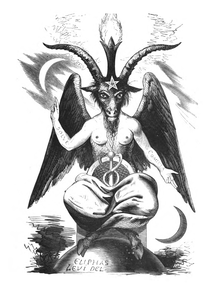Iblis
Iblīs (or Eblis)[1] is the Islamic equivalent of the Christian Satan. Iblis was cast out of heaven by God after he refused to prostrate himself before Adam.
| Part of a series on |
| Islam |
|---|
 |
|
Naming and etymology
The term Iblis (Arabic: إِبْلِيس) may have been derived from the Arabic verbal root BLS ب-ل-س (with the broad meaning of "remain in grief")[2] or بَلَسَ (balasa, "he despaired").[3] Furthermore, the name is related to talbis meaning confusion.[4] Another possibility is that it is derived from Ancient Greek διάβολος (diábolos), which is also the source of the English word 'devil'.[5] However, there is no general agreement on the root of the term. The name itself could not be found before the Quran.[6]
Theology
Although Iblis resembles the Christian notion of Satan, there is no direct correlation. In respect of their disobedience to God the motivation of Iblis and that of the Christian Satan differ, and unlike the Christian notion of Satan there is no mention of Iblis trying to take God's throne[7] Also, given the strict monotheism of Islam, Iblis is not considered the adversary of God with a duel between God and another entity regarded as impossible.[8][9] The enmity of Iblis applies just to God's creation. Iblis only has the power God granted him after his request for permission to tempt humans away from God's path. He is not the cause of evil, but takes advantage of the inclination of humans to be self-centered.[10] Furthermore, the transformation of Iblis from angelic into demonic is a reminder of God's capacity to reverse injustice even on an ontological level.[11] It is both a warning and a reminder because the special gifts given by God can also be taken away by him.[12]
Quran
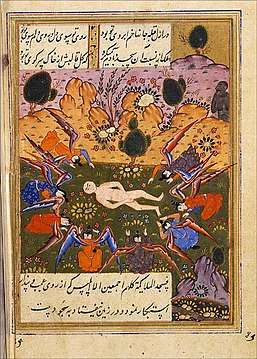
Iblis is mentioned 11 times in the Quran by name, 9 times related to his rebellion against God's command to prostrate himself before Adam. More often occurs the term Shaitan, that is, sometimes related to Iblis. Then God created Adam, He ordered all the angels to bow before the new creation. All the angels bowed down, but Iblis refused to do so. He argued that since he himself was created from fire, he is superior to humans, made from mud, and that he should not prostrate himself before Adam.[13] For his haughtiness, he was banished from heaven and condemned to hell. Therefore, Iblis made a request for the ability to try to mislead Adam and his descendants. God grants his request but also warned that he will have no power over God's servants.[14]
Sufism
Sufism rejects any concept of dualism and instead believes in the unity of existence. Therefore, some mystics hold, Iblis refused to bow to Adam because he was fully devoted to God alone and refused to bow to anyone else. Accordingly, he is regarded together with Muhammad as the two most perfect monotheists. But while Muhammad is the instrument of God's mercy, Iblis is the instrument of God's anger. Furthermore, Iblis is depicted as an example of a true lover of God, teacher of oneness despite physical separation [15] than a failed creature, since he preferred to go to hell than to prostrate himself before someone else other than the "Beloved" (here referring to God). Thus Iblis became an example for unrequited love.
However, not all Sufis are in agreement with a positive depiction of Iblis. Rumi's viewpoint on Iblis is much more in tune with Islamic orthodoxy. Rumi views Iblis as the manifestation of the great sins haughtiness and envy. He states: "(Cunning) intelligence is from Iblis, and love from Adam."[16] Iblis represents the principle of "one-eyed" intellect; he only saw the outward earthly form of Adam, but was blind to the Divine spark hidden in him, using an illicit method of comparison.[17] Hasan of Basra holds that Iblis was the first who used "analogy", comparing himself to someone else, this causing his sin. Iblis therefore also represents humans' psyche moving towards sin or shows how love can cause envy and anxiety losing a beloved one.[18]
Depictions
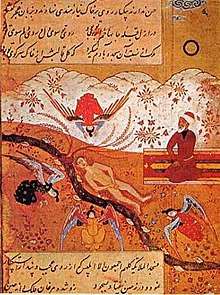
Illustrations of Iblis in Islamic paintings often depict him black-faced, a feature which would later symbolize any Satanic figure or heretic, and with a black body, symbolizing his corrupted nature. Another common depiction shows Iblis wearing special headcovering, clearly different from the traditional Islamic turban. In one painting however, Iblis wears a traditional Islamic headcovering.[19] The turban probably refers to a narration of Iblis' fall: there he wore a turban, then he was sent down from heaven.[20]
Affiliation
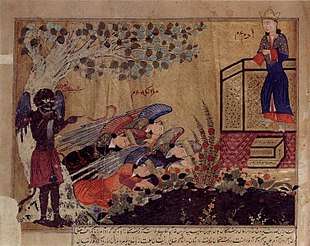
There are different opinions regarding the affiliation of Iblis and there are certain major arguments, found in Quran and hadith literature, to determine his essence:
- The term 'الجِنِّ' (al-jinni) in Surah 18:50 that is interpretated as:
- an inhabitants designation related to 'Jinan' (lit. the Gardens here referring to Jannah), meaning he was from the guardians of heaven.[21][22][23]
- a jinn, a species apart from the angels.
- a designation for a bodiless entity in comparation to al-Ins, a bodily object such as Adam.[24][25][26]
- The verse 2:34 stating: "so they prostrated, except for Iblis" interpretated as:
- since the angels prostrated themselves "except Iblis", Iblis was one of the angels.[27]
- "except for Iblis" means, that he was also not one of them in essence.
- Iblis was like an angel and therefore titled as an angel and outwardly one of them.[28]
- Iblis as being created from fire:
- since the Quran does not state from that the angels were created, there are angels created apart from those created from light, in this case it is from "fire".[29][30]
- "Fire" is the origin from any spiritual creature, either angel, jinn or demon, but all derived from different parts of the fire.
- The fire refers to the smokeless fires, from which the jinn were created and Iblis is a jinn in essence.
- "Fire" and "light" refer to the same thing in this subject.[31]
- residence among the angels:
- Iblis was an angel and therefore among them.
- Although Iblis was not an angel, he was elevated to the rank of an angel.[32]
- progeny:
- angels do not have progeny and Iblis is asexual like the other angels.[33] His progeny mentioned in 18:51 are symbolically referring to those, who follow him.[34]
- after he was turned into a demon, he became a hermaphrodite creature, begatting the demons.[35]
- like with other jinn, he is able to procreate and started procreating after his fall.
- the infallibility of angels, stressed out by some scholars based on certain verses in the Quran:
- Iblis is distinguished by the angels from having free-will, thus he was not an angel, but a jinn or another entity.[36]
- verses designating the angels as noble beings can not prove the impeccability of all angels, since humans are also designated as sinning, while there are people not sinning, such as the prophets.
- angels also err and can be degraded or rewarded, also referring to other narration containing erring angels.
- Iblis disagreement was subject to predeterminism, such that God appointed him as Satan to create the illusion of dualism.[37]
- God gave a contradictional order knowing only Iblis would refuse the latter instruction,[38] since it is forbidden to prostrate before someone else than God. Out of love, Iblis passed the test by refusing to prostrate himself.
At-Tabari, a scholar whose tafsir is highly rewarded in Sunni Islam, and whose opinion became the major opinion for the majority Sunnism[39] and classical Islam[40], also shared by scholars such as Ibn Abbas,[41] Tabari,[42] Ash'ari,[43] and Al-Baydawi[44], wrote regarding the essence of Iblis:
"The reason people held this opinion [that Iblis was not an angel] is that God stated in His Book that He created Iblis from the fire of the Samum (15:27) and from smokeless fire (55:15), but did not state that He created the angels from any like of that. And God states he was of the jinn, so they said that it is not possible that he should be related to that which God does not relate him to; they said that Iblis had progeny and offspring, but the angels do not procreate or have children.
(. .)
But these reasons only bespeak the weakness of these people's knowledge, for there is nothing objectionable in that God should have created the categories of His angels from all kinds of things that He had created: He created some of them from light, some of them from fire, and some of them from what He willed apart from that. There sis thus nothing in God's omitting to state what He created His angels from what He created His angels from, and in His stating what He created Iblis from, which necessarily implies that Iblis is outside of the meaing of [angel], for it is possible that He created a category of His angels, among whom was Iblis, from fire, and even that Iblis was unique in that He created him, and no other angels of His, from the fire of the Samum. Likewise, he cannot be excluded from being an angel by fact that he had progeny or offspring , beause passion and lust, from which the other angels were free, was compounded in him when God willed disobedience in him. As for God's statement that he was <one of the jinn>, it is not to be rejected that everything which hides itself (ijtanna) from the sight is a 'jinn', . . . and Iblis and the angels should then be among them, because they hide themselves from the eyes of mankind."
On the other hand, the famous exegete Ibn Kathir, whose opinion became the major opinion[45] in modern Salafism,[46] regarding the essence of Iblis, stated in his tafsir, that Iblis was not an angel, an opinnion also shared by scholars such as Hasan of Basra, Ibn Taymiyyah and Al-Munajjid but also suggested by Ja'far al-Sadiq,[47]:
"When Allah commanded the angels to prostrate before Adam, Iblis was included in this command. Although Iblis was not an angel, he was trying- and pretending - to imitate the angels' behavior and deeds, and this is why he was also included in the command to the angels to prostrate before Adam. Satan was criticized for defying that command, (. . .)
(So they prostrated themselves except Iblis. He was one of the Jinn;) meaning, his original nature betrayed him. He had been created from smokeless fire, whereas the angels had been created from light, (. . .)
When matters crucial every vessel leaks that which to contains and is betrayed by its true nature. Iblis used to do, what the angels did and resembled them in their devotion and worship, so he was included when they were addressed, but he disobeyed and went what he was told to do. So Allah points out here that he was one of the Jinn, he was created from fire, as He says elsewhere."
Conclusions
Finally, the following four interpretations are commonly accepted among Islamic traditions:[48]
- Before the creation of Adam, there was a tribe of angels, created from fire and called 'Jinn', and Iblis belongs to this tribe. After Iblis disobeyed, he and those from his tribe, who followed him, were cast out from heaven and became Demons.[49]
- Iblis was the first Jinn, created from fire and became the father of all the Jinn.
- Iblis was one of the earthly jinn taken captive by the angel during a battle. Due to his piety, he was elevated to the level of the angels. So even though he was not an angel, he became like one of them.
- Once an angel, Iblis turned into a Jinn by his act of disobedience.
Extra-Quranic narratives
Before the creation of mankind
As an Angel
Iblis was once an Archangel and God's dearest creature. He was the teacher of the other angels, and God gave him authority over the lower heavens. When the jinn increasingly caused corruption on earth, God sent him with an army of angels to battle the jinn and they drove them into the mountains. Iblis felt superior to any other creature, especially since he was, unlike the other angels, created from fire. Then God created Adam and commanded the angels to prostrate before him, Iblis felt humiliated, and refused to accept the superiority of man, who was, according to Iblis, just another fallible entity, who would corrupt God's earth, like the jinn he just defeated before, while he would praise God's glory day and night.[50] Therefore, he was cast out of heaven, but God allows him to proof Iblis objection concerning humanity by tempting them into sin, and gave him a chance to redeem himself.[51][52] Thus although Iblis's pride lost him his position in heaven, he remained part of God's plan.[53]
As a Jinn
Once the angels battled the earthen jinn and took prisoners. One of these was Iblis, who grew up among the angels in heaven, and because of his piety was elevated to their rank, however remaining a jinn but gaining the shape of an angel. When God ordered the angels and Iblis to prostrate themselves before Adam, Iblis abused his free-will and refused haughtily, considering himself superior because of his physical nature constituted of fire and not of clay.[54]Therefore, he was damned to hell but was given respite until the Day of Judgment.
Iblis and the serpent
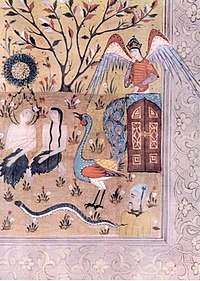
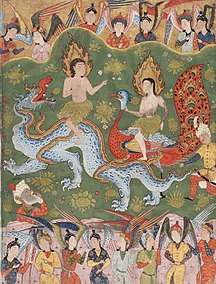
Although the Serpent is not mentioned in the Qur'an, Qur'anic commentaries as well as the Stories of the Prophets added the serpent borrowed from Gnostic and Jewish oral tradition circulating in the Arabian Peninsula.[55] Iblis tries to enter the abode of Adam, but the angelic guardian keeps him away. Then Iblis invents a plan to trick the guardian. He approaches a peacock and tells him that all creatures will die and the peacock's beauty will perish. But if he gets the fruit of eternity, every creature will last forever. Therefore, the peacock convinces the serpent to slip Iblis into the Garden, by carrying him in his mouth. In the Garden, Iblis speaks through the serpent to Adam and Eve, and tricks them into eating from the forbidden tree. Modern Muslims accuse the Yazidis of devil-worship for venerating the peacock. [56]
Moses and Iblis on Sinai
Ghazali told a tale about Iblis meeting Moses on the slopes of Sinai. Accordingly, Moses asks Iblis why he refused God's order. Iblis replied that the command was actually a test. Then Moses replied, obviously Iblis was punished by being turned from an angel to a devil. Iblis responds, his form is just temporary.[57][58]
Iblis' fate in Endtime
Just as there are different views on the origin of Iblis, there are different opinions regarding his lot during the Endtime:
- Iblis and his host are the first who enter hell and will dwell there for eternity.[59]
- After the world perishes, Iblis assignment as tempter for humanity and his punishment alike are over. Therefore, Iblis will be forgiven and he will return to heaven as one of God's cherished Angels.[60]
- Still before the world perishes, Iblis will be killed in a battle by the Mahdi, an interpretation especially prevalent among Shia Muslims.[61]
See also
References
- ↑ Constance Victoria Briggs The Encyclopedia of God: An A-Z Guide to Thoughts, Ideas, and Beliefs about GodHampton Roads Publishing 2003 ISBN 978-1-612-83225-8
- ↑ Ebrahim Kazim Scientific Commentary of Suratul Faateḥah Pharos Media & Publishing 2010 ISBN 978-8-172-21037-3 page 274
- ↑ "Iblis".
- ↑ Nicholson Studies In Islamic Mystic Routledge 2013 (first published 1998) ISBN 978-1-136-17178-9 page 120
- ↑ "Iblīs - BrillReference".
- ↑ Jeffrey Burton Russell Lucifer: The Devil in the Middle Ages Cornell University Press 1986 ISBN 978-0-801-49429-1 page 55
- ↑ Vicchio, Stephen J. Biblical Figures in the Islamic Faith. Wipf and Stock. 2008. ISBN 9781556353048, pages 175-185.
- ↑ N. Ahmadi Iranian Islam: The Concept of the Individual Springer 1998 ISBN 978-0-230-37349-5 page 80
- ↑ Islam, Arabs, and Intelligent World of the Jinn Syracuse University Press 2009 ISBN 9780815650706 page 46
- ↑ Charles Mathewes Understanding Religious Ethics John Wiley & Sons 2010 ISBN 978-1-405-13351-7 page 248
- ↑ Richard Gauvain Salafi Ritual Purity: In the Presence of God Routledge 2013 ISBN 9780710313560 page 74
- ↑ Richard Gauvain Salafi Ritual Purity: In the Presence of God Routledge 2013 ISBN 9780710313560 page 74
- ↑ Quran 7:12
- ↑ Quran 17:65. ""As for My servants, no authority shalt thou have over them:" Enough is thy Lord for a Disposer of affairs."
- ↑ Islam, Arabs, and Intelligent World of the Jinn Syracuse University Press 2009 ISBN 9780815650706 page 44
- ↑ Annemarie Schimmel The Triumphal Sun: A Study of the Works of Jalaloddin Rumi Annemarie Schimmel SUNY Press 1993 ISBN 978-0-791-41635-8 page 255
- ↑ Walī Allāh al-Dihlawī Shāh Walī Allāh of Delhi's Hujjat Allāh Al-bāligha BRILL 1996 ISBN 978-9-004-10298-9 page 350
- ↑ Jalāl ad-Dīn Muhammad Rūmī, Rumi Collected Poetical Works of Rumi (Delphi Classics) Delphi Classics 2015 story XI
- ↑ Na'ama Brosh, Rachel Milstein, Muzeʼon Yiśraʼel (Jerusalem) Biblical stories in Islamic painting Israel Museum 1991 page 27
- ↑ Aḥmad ibn Muḥammad Thaʻlabī, William M. Brinner ʻArāʻis al-majālis fī qiṣaṣ al-anbiyā, or: Lives of the prophets, Band 24 2002 ISBN 978-9-004-12589-6 page 69
- ↑ https://islaambooks.files.wordpress.com/2012/05/the-commentary-on-the-quran-volume-i-tafsir-al-tabari.pdf page 139
- ↑ Roger Allen Studying Modern Arabic Literature Edinburgh University Press 2015 ISBN 978-1-474-40349-8 Notes
- ↑ Patrick Hughes, Thomas Patrick Hughes Dictionary of Islam Asian Educational Services 1995 ISBN 978-8-120-60672-2 page 135
- ↑ Hans Gerhard Kippenberg, Y. Kuiper, Andy F. Sanders Concepts of person in religion and thought Monton de Gruyter 1990 ISBN 978-0-899-25600-9 page 220
- ↑ Amira El-Zein Islam, Arabs, and Intelligent World of the Jinn Syracuse University Press 2009 ISBN 9780815650706 page 34-37
- ↑ https://islaambooks.files.wordpress.com/2012/05/the-commentary-on-the-quran-volume-i-tafsir-al-tabari.pdf page 139
- ↑ Joseph Hell Die Religion des Islam Motilal Banarsidass Publishe 1915 page 142
- ↑ Muhammad Saed Abdul-Rahman Tafsir Ibn Kathir Juz' 1 (Part 1): Al-Fatihah 1 to Al-Baqarah 141 2nd Edition MSA Publication Limited 2013 ISBN 978-1-861-79826-8 page 136
- ↑ Patrick Hughes, Thomas Patrick Hughes Dictionary of Islam Asian Educational Services 1995 ISBN 978-8-120-60672-2 page 135
- ↑ Leo JungFallen Angels in Jewish, Christian, and Mohammedan LiteratureWipf and Stock Publishers 2007 ISBN 978-1-556-35416-8 page 60
- ↑ M. Th. Houtsma E.J. Brill's First Encyclopaedia of Islam, 1913–1936, Band 5 BRILL 1993 ISBN 978-9-004-09791-9 page 191
- ↑ Muhammad Saed Abdul-Rahman Tafsir Ibn Kathir Juz' 1 (Part 1): Al-Fatihah 1 to Al-Baqarah 141 2nd Edition MSA Publication Limited 2013 ISBN 978-1-861-79826-8 page 136
- ↑ Abdelwahab Bouhdiba Sexuality in Islam Routledge 2013 ISBN 978-1-135-03037-7 page 59
- ↑ Walther Eickmann Die Angelologie und Dämonologie des Korans im Vergleich zu der Engel- und Geisterlehre der Heiligen Schrift Eger 1908 p. 27 (german)
- ↑ Tobias Nünlist Dämonenglaube im Islam Walter de Gruyter GmbH & Co KG, 2015 ISBN 978-3-110-33168-4 p.53-54 (German)
- ↑ Amira El-Zein Islam, Arabs, and Intelligent World of the Jinn Syracuse University Press 2009 ISBN 9780815650706 page 46
- ↑ Ludo Abicht Islam & Europe: Challenges and Opportunities Leuven University Press 2008 ISBN 978-9-058-67672-6 page 128
- ↑ Ludo Abicht Islam & Europe: Challenges and Opportunities Leuven University Press 2008 ISBN 978-9-058-67672-6 page 128
- ↑ Richard Gauvain Salafi Ritual Purity: In the Presence of God Routledge 2013 ISBN 9780710313560 page 73
- ↑ Alford T. Welch Studies in Qur'an and Tafsir American Academy of Religion 1980 digitized 18. 10. 2008 Original: Indiana University page 756
- ↑ Patrick Hughes, Thomas Patrick Hughes Dictionary of Islam Asian Educational Services 1995 ISBN 978-8-120-60672-2 page 135
- ↑ Brannon M. Wheeler Prophets in the Quran: An Introduction to the Quran and Muslim Exegesis A&C Black, 18.06.2002 page 16 ISBN 978-0-826-44957-3
- ↑ Miguel Asin Palacios Islam and the Divine Comedy Routledge 2013 ISBN 978-1-134-53643-6 page 109
- ↑ Stephen J. Vicchio Biblical Figures in the Islamic Faith Wipf and Stock Publishers 2008 ISBN 978-1-556-35304-8 page 183
- ↑ Dan Burton, David Grandy Magic, Mystery, and Science: The Occult in Western Civilization Indiana University Press 2004 ISBN 978-0-253-21656-4 page 145
- ↑ Richard Gauvain Salafi Ritual Purity: In the Presence of God Routledge 2013 ISBN 9780710313560 page 69
- ↑ Mahmoud M. Ayoub Qur'an and Its Interpreters, The, Volume 1, Band 1 SUNY Press ISBN 978-0-791-49546-9 page 86
- ↑ Patrick Hughes, Thomas Patrick Hughes Dictionary of Islam Asian Educational Services 1995 ISBN 978-8-120-60672-2 page 135
- ↑ Stephen J. Vicchio Biblical Figures in the Islamic Faith Wipf and Stock Publishers 2008 ISBN 978-1-556-35304-8 page 183
- ↑ James William Hampson Stobart Islam & Its Founder Society for Promoting Christian Knowledge 1876 digitized 2006 original: Oxford University page 114
- ↑ Jamal J. Elias Key Themes for the Study of Islam Oneworld Publications 2014 ISBN 978-1-780-74684-5 chapter: Eschatology
- ↑ Annemarie Schimmel Gabriel's Wing: A Study Into the Religious Ideas of Sir Muhammad Iqbal Brill Archive 1963 page 212
- ↑ Annemarie Schimmel Gabriel's Wing: A Study Into the Religious Ideas of Sir Muhammad Iqbal Brill Archive 1963 page 212
- ↑ Ali Unal The Qur'an with Annotated Interpretation in Modern English Tughra Books 2008 ISBN 978-1-597-84144-3 page 29
- ↑ Amira El-Zein Islam, Arabs, and Intelligent World of the Jinn Syracuse University Press 2009 ISBN 9780815650706 page 98-99
- ↑ Birgül Açikyildiz The Yezidis: The History of a Community, Culture and Religion I.B.Tauris 2014 ISBN 978-0-857-72061-0 page 161
- ↑ Richard Gramlich Der eine Gott: Grundzüge der Mystik des islamischen Monotheismus Otto Harrassowitz Verlag 1998 ISBN 978-3-447-04025-9 page 44
- ↑ Joseph E. B. Lumbard Ahmad al-Ghazali, Remembrance, and the Metaphysics of Love SUNY Press 2016 ISBN 978-1-438-45966-0 page 111-112
- ↑ Christian Lange Paradise and Hell in Islamic Traditions Cambridge University Press 2015 ISBN 978-1-316-41205-3 page 141
- ↑ Annemarie Schimmel Gabriel's Wing: A Study Into the Religious Ideas of Sir Muhammad Iqbal Brill Archive 1963 page 212
- ↑ Jane Idelman Smith, Yvonne Yazbeck Haddad The Islamic Understanding of Death and Resurrection Oxford University Press 2002 ISBN 978-0-198-03552-7 page 86
.png)
